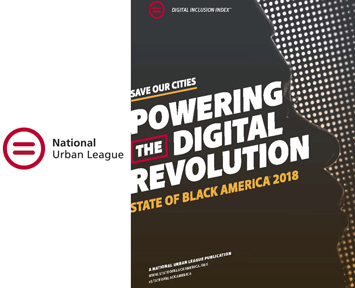Black America left behind as digital revolution chugs on
By Barrington M. Salmon -Contributing Writer- | Last updated: May 9, 2018 - 7:54:20 AMWhat's your opinion on this article?
WASHINGTON—Blacks have made incremental progress in the areas of health, education, housing and economics in the past year, but these advances and other hard-earned progress made over the past five decades is in danger of being lost or seriously eroded.

|
The 2018 State of Black America, an annual report produced by the National Urban League, points to technology as one area of growing concern. While Blacks and Hispanics are avid consumers of digital technology, they are grossly underrepresented in the digital workforce. It is estimated that fewer than five percent of Silicon Valley’s workforce is Black.
“African Americans have proven to be eager, early adopters of technology, leading influencers and content creators in social media—as evidenced by the power of ‘Black Twitter,’” said Mr. Morial. “Yet, nearly one-third of low-income families with school-aged children have no access to broadband at home. Lacking this vital tool, many students are left with few realistic options to access the internet, leaving them digitally undeveloped and vulnerable to low earning outcomes.”
In the past, Mr. Morial, said Blacks have been deliberately blocked from access to, and the benefits of, different technologies during slavery, Reconstruction and Jim Crow. White Americans blocked Blacks from the benefits of farm technology, or the revolutions of technology during the last century. The result of this lack of inclusion, he said, has left Blacks dealing with the myriad of disparities that exist today.
Historically, while great industrial breakthroughs have profited the nation, Black Americans have often been exploited, rather than elevated by these advancements. Blacks could not participate in the farming revolution at its start because they were enslaved. During Reconstruction (roughly from 1865–1877), free Blacks struggled to keep the property they owned and were largely unable to afford farming’s new and expensive tools. While White farmers increased crop yields and cultivated their wealth, Blacks were relegated to the sidelines, watching as opportunities for economic self-reliance and generational wealth building passed them by.
For the past several years, the Congressional Black Caucus, and civil rights organizations including the Urban League have been pressuring tech leaders like Google, Uber, Twitter and Facebook to open their doors to more Blacks. Despite a barrel of promises from tech executives, the needle has barely moved.
“The great promise of the digital age to right the historical wrongs visited on African Americans during previous industrial eras will be an empty one until our private, government and corporate sectors focus on minority ownership, workforce hiring, management positions, and increased racial and gender representation in c-suites and on boards of directors,” Mr. Morial continued. “We are doomed to repeat history if we throttle the bandwidth to key drivers of economic opportunity and mobility.”
Mr. Morial said that overall, despite the undeniable—yet slow—gains of Blacks and Hispanics, a significant portion of the equality pie is missing.
“Income disparities remain a distressing hallmark of our economy with African Americans and Hispanics earning a median household income of $38,555 and $46,882, respectively, compared to a white median household income of $63,155,” he said. “People of color are persistently under or unemployed. Nationally, African Americans have the highest unemployment rate at 7.5 percent, followed by Hispanics at 5.1 percent.”
“The work we do today to narrow our nation’s long existing racial gaps in income, wealth and educational attainment will be powered and profoundly shaped by the global 21st century digital revolution; success will be determined by our access to and strategic use of emerging technologies,” Mr. Morial concluded.
INSIDE STORIES AND REVIEWS
-
-
About Harriett ... and the Negro Hollywood Road Show
By Rabiah Muhammad, Guest Columnist » Full Story -
Skepticism greets Jay-Z, NFL talk of inspiring change
By Bryan 18X Crawford and Richard B. Muhammad The Final Call Newspaper @TheFinalCall » Full Story -
The painful problem of Black girls and suicide
By Charlene Muhammad -National Correspondent- » Full Story -
Exploitation of Innocence - Report: Perceptions, policies hurting Black girls
By Charlene Muhammad -National Correspondent- » Full Story -
Big Ballin: Big ideas fuel a father’s Big Baller Brand and brash business sense
By Bryan Crawford -Contributing Writer- » Full Story






 Click Here Stay Connected!
Click Here Stay Connected!








